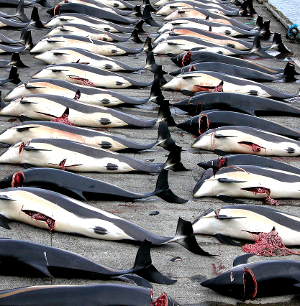Questions over what will stop as whale ban brings new plan
 Japan has been ordered to stop whaling in the Antarctic by the International Court of Justice (ICJ), and says it will halt activities and not issue any more permits under current programs.
Japan has been ordered to stop whaling in the Antarctic by the International Court of Justice (ICJ), and says it will halt activities and not issue any more permits under current programs.
Japanese authorities say they will comply with the ruling by the ICJ's 16-judge panel, which found that the ongoing destruction of Antarctic whales was for political and economic purposes, and had little research value.
Japanese research has produced just two peer-reviewed papers since 2005, which were based on results obtained from just nine dead whales.
“In light of the fact the JARPA II [research program] has been going on since 2005, and has involved the killing of about 3,600 minke whales, the scientific output to date appears limited,” presiding judge Peter Tomka of Slovakia said.
“We are deeply disappointed and regret that the court ruled that Japan's research whaling program in the Antarctic did not fall within the special permit clause of the treaty,” spokesperson Nori Shikata has told ABC News.
“This is a final verdict and we are saying in a very straight forward way that we will abide by the judgement of the court
“We will abide by the decision of the courts and although we will consider a concrete future course of action very carefully, upon studying what is stated in the judgement, we will cease the current research whaling program in the Antarctic pursuant to the judgement.”
The Australian Government’s response has been somewhat muted so far, but former environment minister Peter Garrett, who launched the legal action in 2010, could barely contain himself.
“This is a comprehensive and resounding decision in Australia's favour,” he told the ABC.
“It means we won't see harpoons in the Southern Ocean - we certainly shouldn't see them down there any longer.
“I'm absolutely over the moon for all those people who wanted to see the charade of scientific whaling cease once and for all,” he said.
Shadow attorney-general Mark Dreyfus, who argued Australia's side of the case, said it would set a precedent for other nations.
“This was a pioneering piece of litigation - the first time that there had been litigation in the International Court of Justice about an environmental treaty,” he said.
“It's going to pave the way for more environmental litigation I could expect between nations.”
Attorney-General George Brandis was keen to point out that it was an isolated event.
“The fact that Australia and Japan were able to be in dispute on this narrow issue in the International Court of Justice, but nevertheless maintain an excellent relationship notwithstanding that difference, I think demonstrates very clearly what a strong relationship this is,” he said this week.
But many figures expect Japanese whaling will continue, and other nations’ whaling activities will keep going too.
In interviews this week, Australian academics and Japanese fishing authorities both indicated that the legal victory was only a temporary win, and that the programme would simply be redrawn in a new guise.
Professor of international law at the Australian National University, Dr Don Rothwell, said he was concerned because Article Eight of the anti-whaling convention remains in place, which permits whaling under scientific pretences. He says it is possible the nation would withdraw entirely from the International Convention for the Regulation of Whaling.
Masayuki Komatsu, former chief of the Japanese Fisheries Agency said in an interview this week that Japan will continue whaling.
“My personal view is there are plenty of minke whales, humpback whales and fin whales... so the basis of the ICJ [asking] Japanese JARPA to stop is totally irrelevant,” he told the ABC.
“Clear-cut, simple evidence is that whale resources are abundant and international convention allows all other facilities sustainable use of the whale resources.”







 Print
Print